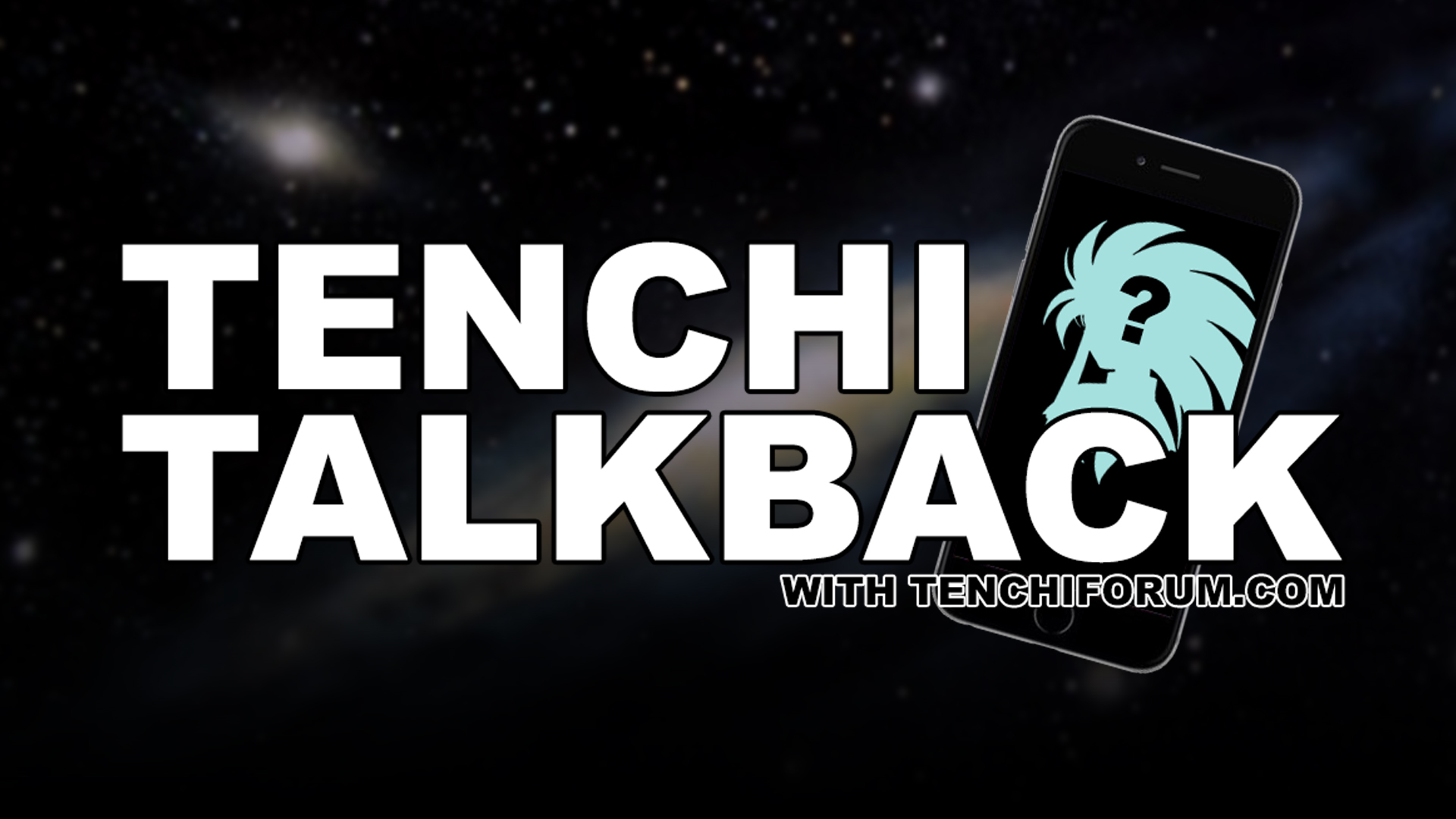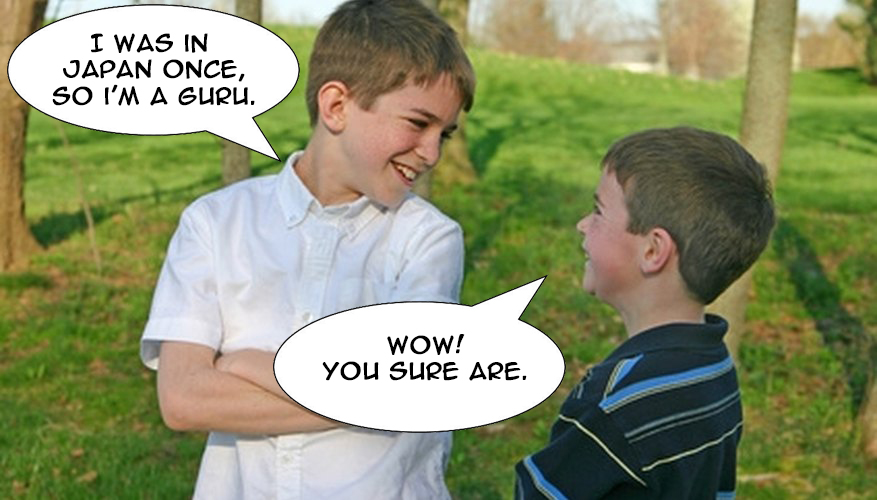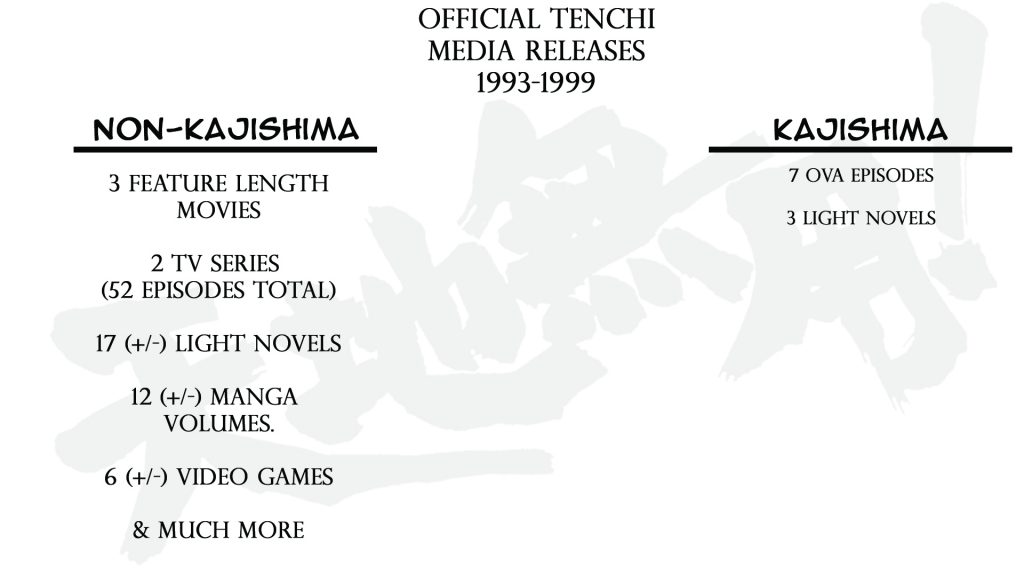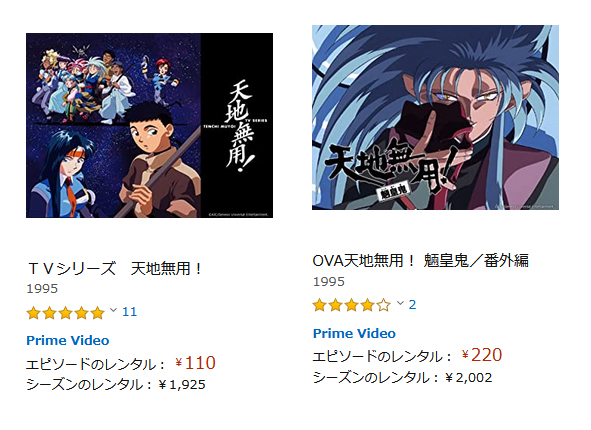
What was the true reception of Universe/TV in Japan?? from everything I and many ppl have heard it wasn’t as praised as the ova and some past viewers have even completely forgotten that it existed and that most Japanese fans are very pro kajishima so they purposely overlook it .. I have no idea what’s fiction and what’s fact
Ah, yes. This reminds me of the old days, where any kid on the playground clever and enterprising enough to spout some iteration of ‘my uncle works at Nintendo’ could convince naive peers of his prowess about a faraway land like Japan.

(It’s not to say this isn’t a good question, because it is, I just got nostalgic for some reason!)
Which was “praised” more? A fair question, but it’s an intangible, subjective criterion with no real way to effectively measure it (at least, not in this limited space). Nevertheless, let’s take to task untangling some of this.
The first OVA of Tenchi Muyo! Ryo-Ohki, released in 1992, was certainly beloved—and little wonder why: gorgeous animation, charming characters, and a smooth mixture of sci-fi and fantasy. But if we go back in time, we must remember that there wasn’t a convenient way for fans of a particular program to gather and revel on a daily basis like there is today with the internet and social media as we now know it.
So how did Tenchi as an entity really get rolling in terms of viewership? If you answered television, you got it! In those days TV was king, so what many of us know as Tenchi Universe was simply known as Tenchi Muyo! in Japan. Wouldn’t that be confusing? Not really, because again, back then Ryo-Ohki was a straight-to-video product on LaserDisc, meaning it’s likely that fewer people overall were aware of its existence, much less viewed it, than those who may have overheard or caught glimpses of its televised counterparts while going about their daily routines.
For a broad swath of viewers, their first (and perhaps only) viewing of something called Tenchi Muyo! would have been on TV circa 1995. By the time Tenchi was advertised to us Westerners, multiple continuities existed and were introduced at around the same time (think Toonami in the U.S., for example); furthermore, what would have previously been only on a home-video format was broadcast on the airwaves, thus creating a need to differentiate and an opportunity for clever advertising (Tenchi Muyo! meaning the OVA, Tenchi Universe for the TV series, and Tenchi in Tokyo for the later TV reboot called New Tenchi Muyo! in Japan).
Fast-forward some twenty years into the future: people who may have watched Tenchi casually on TV (Japan or elsewhere) have largely moved on, while those who are crazy—I mean, passionate—enough to remain invested in the franchise as enthusiasts now have the internet on which to share, reminisce, and pontificate. Which is an enthusiast going to say is better? The big budget OVA with ‘too hot for television’ scenes, or the TV series with a smaller budget? Exactly.
Thus the allure of Tenchi lives on, albeit primarily through ritualistic exaltation of the initial OVA that is not only higher quality (granted, it’s a tad unfair to compare Pioneer OVA and TV production values, but it’s the truth), but also the original Tenchi Muyo! timeline.
And speaking of allure, though the accessibility afforded by modern-day internet skews some of our perspectives of the present matter, one thing true about us nerds today also rang true then: Which would the ‘hardcore’ fans be more into? The one that all those, pardon my French, ‘filthy casuals’ are watching on TV, or the raunchier, more esoteric epic that you can only see if you have a LaserDisc player? You got it.
(And of course you’re going to buy the Pioneer model, since you want quality and are a true fan, right?)
As readers of our Talkback column or anyone still in Tenchi fandom can probably guess, however, other factors complicate this further: the less-than-amicable split between creators Masaki Kajishima and Hiroki Hayashi.
When Hayashi left Tenchi to work on the El-Hazard OVA, this left the only remaining co-creator, Kajishima, with more creative control. Tenchi Muyo! outgrew him as a juggernaut franchise, however, and by the late 1990s there were more official Tenchi side projects that did not reflect his vision than those that did! This contributed to a scarcity value for the OVA story line.

As fans are wont to desire, the aura of a quote-unquote original anything is strong. Though Kajishima always received an obligatory credit for original concept, other iterations of Tenchi Muyo! brought with them other authorial voices that, arguably, diminished his own: for starters, there’s Hiroshi Negishi as director of Tenchi Universe (which merited two feature-length film continuations), and original OVA screenwriter Naoko Hasegawa, later writing not only for Universe, but also the movie Midsummer’s Eve alternatively known as Daughter of Darkness (1997); I haven’t even mentioned artist Hitoshi Okuda, who wrote his own popular Tenchi manga!
Over the years, while Kajishima remained involved in the OVA continuity and its spin-offs, eventually more and more of these creative voices drifted away or moved on due to the nature of the business (you go where the work is) and AIC being, shall we say, down on its luck; with Hayashi gone, and modern-day AIC unable to throw resources into multiple Tenchi ventures, Kajishima became the proverbial last man standing. Considering his continuous fan outreach by way of limited-run, unofficial doujinshi and his involvement with Tenchi Muyo! since the very beginning, it’s understandable that if anybody in Japan is left to actively partake in the fandom, they’re probably going to be fans (dare I say, oftentimes, devotees) of Kajishima himself.
It should be noted, however, that these active fans are currently few in number (not to diminish their importance, in any sense); even loyal followers of Kajishima have found it vexing to either be patient with the lack of output or accommodating of whatever new sexual fetish he tries incorporating into Tenchi Muyo! proper—and when they do get something, lately it’s been an underwhelming installment like OVA 4 (which is mostly monologues and rather low-budget animation, but I digress).
The point is that all these reasons and more (like nurturing fond memories of OVA 1 while avoiding or remaining unaware of later continuations) contribute to a prestige of the OVA pedigree that, frankly, no longer exists even in its homeland. But if you’re in the United States, Europe, or Latin America, Japan is far, far away: a perceived reverence for a particular continuity may exist, propped up by insufficient insights, lack of firsthand experience, and some kid on the digital playground spouting the equivalent of ‘my uncle works for AIC.’
It’s not to say that we fans are gullible, but rather that we often only see a small part of a greater whole, and these observations, if extrapolated too far, can dispose us to inaccurate perceptions.
(Reminds me of a parable about blind men and an elephant.)
Paradoxically, however, the figurative cul-de-sac that Kajishima created around his ever-expanding multiverse has caused some Japanese fans to go back to other series they may have initially overlooked or simply missed, like Universe, especially since many are available streaming or have just been re-released on Blu-ray. And when AIC president Toru Miura (who has also been with Tenchi since the beginning, before his recent departure) sought to revive the franchise in 2014, he brought back Universe director Hiroshi Negishi to direct a new mini-series called Ai Tenchi Muyo! (Tenchi Muyo! Love), set in yet another timeline outside the OVA.
Would he have gambled this important business decision with extremely limited funds if Negishi, and by extension Universe, weren’t “praised” by Japanese fans? I don’t think so, either!
Got a question you want to see answered? Send us a message on social media, discuss on the forum, or email us at contact@tenchiforum.com

